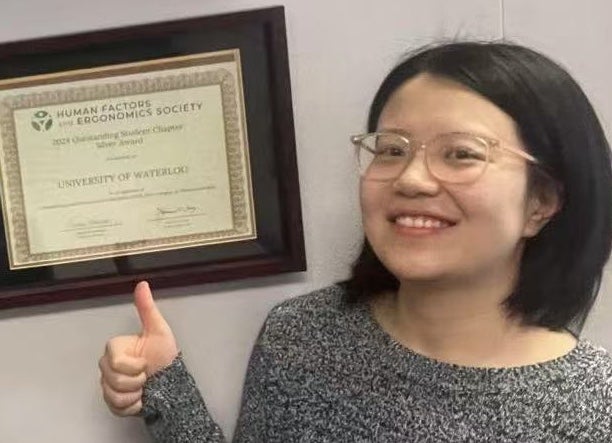The increasing integration of cars with advanced technologies such as artificial intelligence (AI) means fully autonomous vehicles (AVs) will likely be a reality by 2050 if not sooner. These self-driving vehicles will not just operate with minimal human intervention, they will make "decisions" to adapt and react to changing situations on the road. Human drivers will literally take a back seat.
But the more advanced cars become, the greater their vulnerability to cyberattacks. Fan He, a PhD candidate in the Department of Systems Design Engineering at the University of Waterloo is researching how drivers respond to different levels of cyberattacks to develop strategies and infrastructure that meet changing road safety requirements.
"New cars are already packed with potentially exploitable technologies and fully autonomous vehicles will be especially vulnerable," says He. "The malicious infiltration of a car's computer system could affect its critical functions and cause accidents, putting all road users at risk."
He's research is a collaborative project with her colleagues in Waterloo's Advanced Interface Design Lab and the Department of Electrical and Computer Engineering. As the inaugural recipient of the Maks Wulkan Graduate Scholarship, valued at up to $50,000, He has been able to develop her research over three distinct phases, each targeting different aspects of the driver response to various cyberattack scenarios.
Phase one modeled how drivers reacted to distraction attacks such as sudden volume changes to the car's radio or the unexpected flashing of hazard lights. These attacks had a moderate impact on drivers' performances, but the risk level increased when the attacks involved complex information processes such as navigation tasks.
In phase two, the team prototyped a simulated virtual driving experience using a Tesla Model 3's console. A total of 94 qualified adult participants took part in the online study which delved into more complex attack scenarios including missing GPS information or distracting in-vehicle notifications. In these events, drivers also tended to stop driving to address the issues and seek help from roadside assistance or emergency services.
The results of both phases indicated that drivers do not have the knowledge or tools to respond to cyberattacks effectively.
Now in phase three, He is investigating how to improve road safety infrastructure so that drivers and passengers recognize a cyberattack when it happens and can access experienced cybersecurity experts for quick assistance.
"The role of the driver is changing," He says. "With more people driving automated, software-enabled vehicles, drivers are becoming more and more like passengers."
According to He, this shift requires a connected network of cybersecurity operation centres with data analysts devising preventative interventions and experts at the ready to assist people in automated vehicles during a cyberattack.
"We want to know how passengers can collaborate with external agents in the event of a cyberattack," she says. "What are the safest responses when you can't directly control the vehicle? I aim to identify the kinds of attacks that would be most impactful on AV users and then look at ways they can defend against these potential dangers."
 Fan He, PhD candidate in the Department of Systems Design Engineering at the University of Waterloo.
Fan He, PhD candidate in the Department of Systems Design Engineering at the University of Waterloo.
He's research thesis emerges from the field of human factors engineering (HFE) which examines how humans and technology interact, emphasizing ways to enhance safety, usability and efficiency, the goal being to design systems that improve the human experience.
The Maks Wulkan Graduate Scholarship supports doctoral research in the Faculty of Engineering with an interest in HFE and is made possible by a donation from Waterloo Engineering alum Maks Wulkan (BASc '75).
"The partnership between people and technology is still evolving," Wulkan says. "Human Factors Engineering adds a crucial dimension to traditional engineering by ensuring we design not just for functionality, but for meaningful adoption and intuitive use. Now more than ever, with the financial pressures of today's economy, supporting dedicated scholars like Fan He is a critical investment in that future."
For He, the most important part of winning the scholarship is the encouragement and confidence it has given her to pursue and deepen her HFE research interests, as well as explore new directions.
"And thanks to this financial support, particularly now in a time of high living costs," He adds, "I have been able to focus on my research with less stress or interruptions. This means I'll be able to share meaningful results and actionable solutions that are robust and timely."
The HFE field is important to He even when she's not busy with her research. As President of the Waterloo Chapter of the Human Factors and Ergonomics Society (HFES), she has led initiatives that bridge disciplines to address the complexities of human-technology interaction. Under her leadership, the chapter received the Outstanding Student Chapter Silver Award in 2024.
"Human-technology interaction is only just getting started," He says. "The more we do now to explore HFE in all areas of our lives, the better prepared we'll be for the future - both on and off the road."






